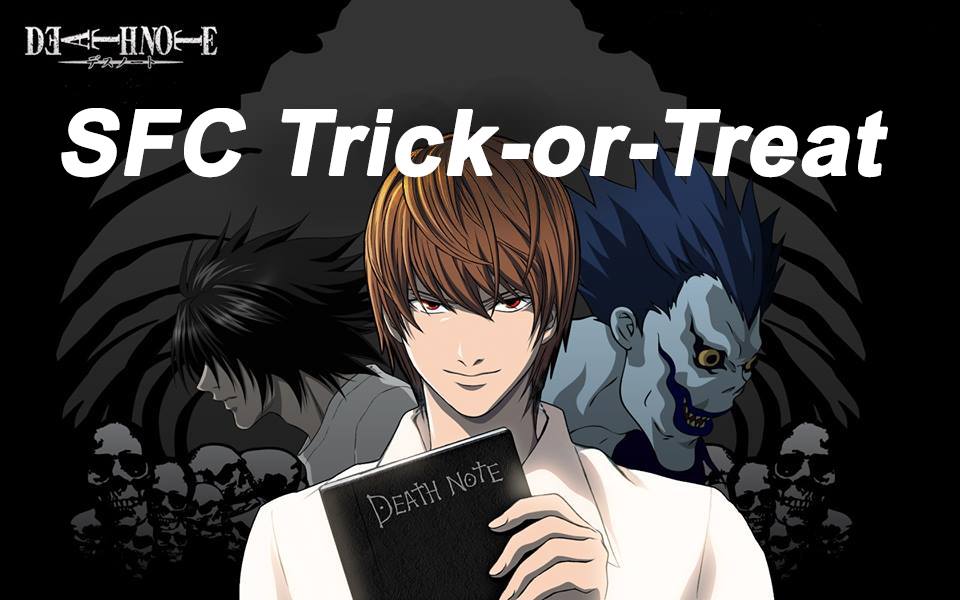Usually when I say I’m an anime fan, people tend to think that I have my house decorated with the cheesiest Japanese tchotchkes, posters of Dragon Ball Z hanging over my bed, a scantily-clad Sailor Moon figurine by my computer, and a metric ton of bootleg DVDs of Japanese cartoons. That is, they think I’m the nerdy equivalent of the “Cat Lady.”
But I’m not. I just happen to really enjoy anime. But I like it not because it is just anime, not because it’s Japanese, and not because it’s not (really) mainstream. I like it because among the various video media, anime consistently makes some of the most profound, thought-provoking shows–not to mention how awesome they look most of the time. Granted there are those anime that are childish and juvenile–mostly because their audiences are children and juveniles–but when they make a serious show, it’s almost always great.
Today for my spot I wanted to talk about one that I just recently watched called Death Note. A few years ago I saw this show airing on Cartoon Network’s late night slot called Adult Swim, and I really tried to get into it–partly because of the arresting visuals, but also because it was unmistakably suspenseful. Because of its unbroken narrative from episode to episode, it was confusing to watch unless I had started at episode one, but thanks to the joys of Netflix, I binge watched it in just a few days. I’m leaving out big spoilers, but I will be talking about a few things that happen in the first couple of episodes for explanation.
Death Note has become sort of a cult classic in the anime world, it seems. And I do think it’s worthy of the praise it gets. Its plot is unique and gripping: a shinigami (death god in Japanese folklore) comes to the human world and deliberately drops his notebook for an unsuspecting human to pick up. High School senior Light Yagami picks it up and sees the terrifying shinigami. The notebook, or “death note,” has clear instructions, the primary rule being that whenever the owner of the notebook writes a name in the notebook, that person will die.
Yeah.

The notebook has a few other rules that specify how the person will die, when they will die, etc., but the end result is the same: someone dies. Now, as you suspect, this is a terrifying power to wield. And Light Yagami tests the notebook’s power on criminals just to be safe, deciding that it is his responsibility to mete punishment on only those who are guilty. But because so many criminals are dying mysteriously, it gets the attention of the government authorities, and they determine that it is a work of a new serial killer they dub “Kira” (Japanese wordplay for “killer”). And they assign a brilliant, eccentric detective only known by the name “L.” Light, now known as Kira, now faces a deducing duel between L and himself. L wants to find out who Kira is and bring him to justice through the proper channels, and Kira now wants to kill L to stop his investigation and stop the only resistance he has to keep him from enacting his own justice with his death note.
It’s a gripping show that is parts supernatural thriller, murder mystery, and character study. It is philosophical without beating you over the head with it. It is “power corrupts; absolute power corrupts absolutely.” As a Christian I find it a thought-provoking exercise in thinking about divine judgement, revenge, murder, the means and ends, human depravity, and the death penalty.
My point isn’t to talk about these topics right now or to reveal what I believe about any of these, or even if the show led me to change my mind at all. But, these are some spiritual and philosophical questions that I think many Christians shy away from–though they are very important.
The show is thirty-seven episodes long, and although I do recommend watching the show, I must admit that I think it’s about ten episodes too long. There are strings of episodes that are absolutely enthralling, while others…aren’t. In some ways, the ending to the series is different than I had anticipated, but, really, it ended exactly as it should have.
Overall, this is a great show and I highly recommend watching it–especially if you have Netflix. This is the perfect show for the Halloween season and is a great visual treat. It’s a great show that makes you think about uncomfortable things–in a good way. Maybe this article will ease the SFC into more anime articles (or maybe even persuade Ben to give the genre a chance?? Nope).
To end this, I was going to sign off as usual, but I have an unusual fear of you writing my name down…for some reason.
“D”


Great article, Dave! And it sure sounds like an intriguing show. I think you’re right: these are topics we tend to draw back from, even though our faith should encourage us to engage them.
Maybe you can introduce us to more anime going forward!